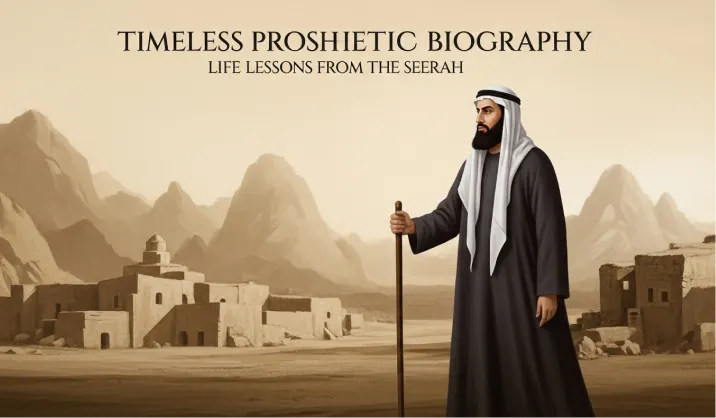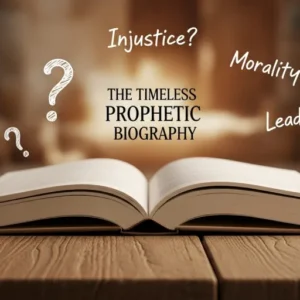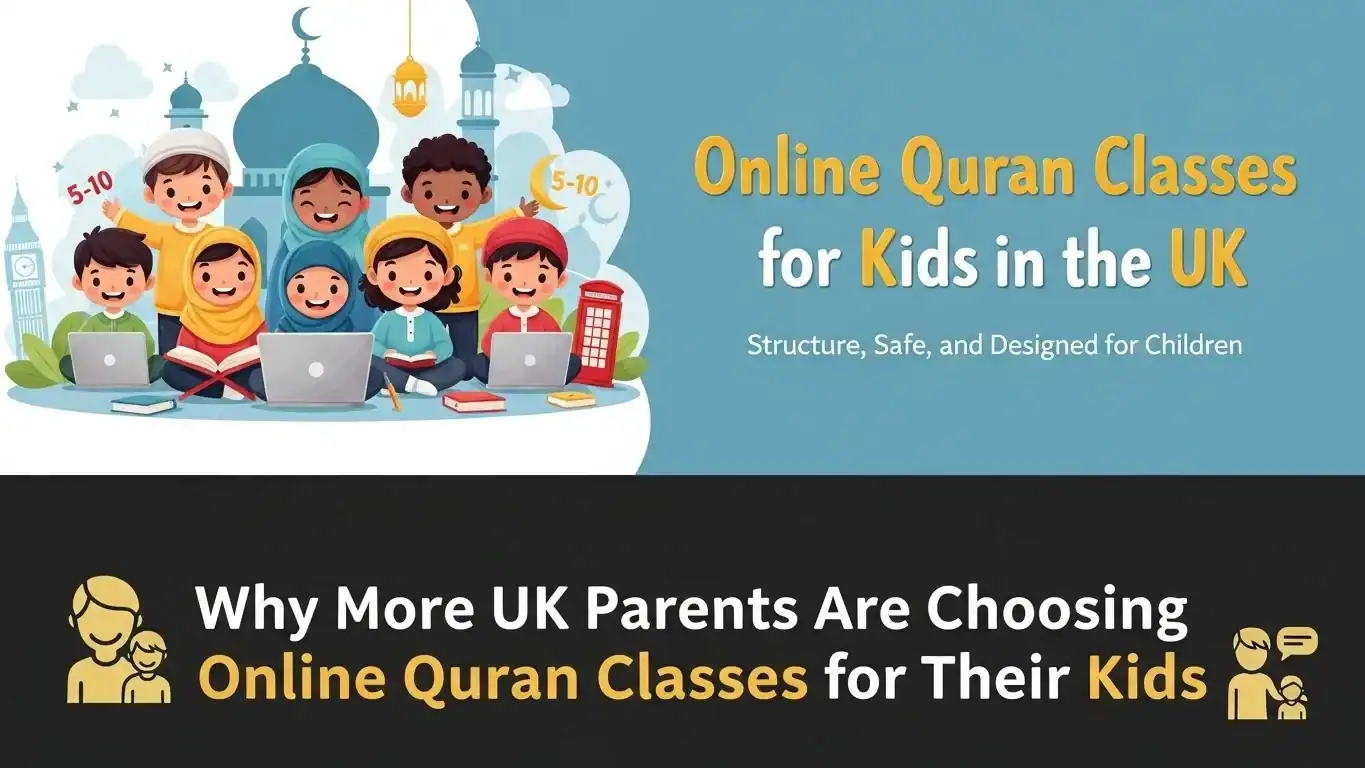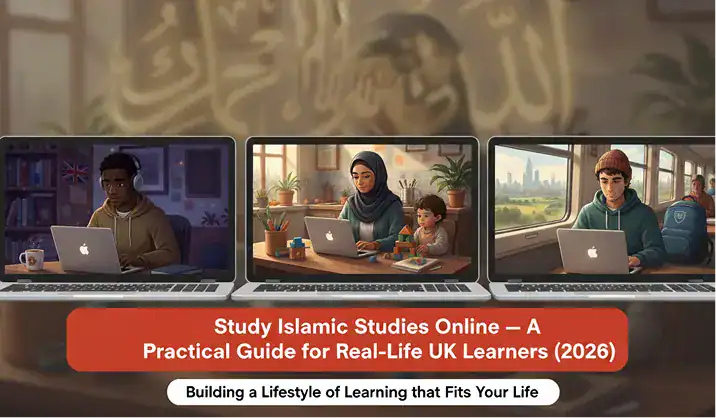Overview
The Timeless Prophetic Biography is more than history; it’s a living guide for Muslims today.
From childhood challenges to building a just society in Madinah, every moment of the Prophet Muhammad’s
(peace be upon him) life provides lessons in faith, leadership, and resilience.
His Seerah shows us how to raise families, lead communities, and live with justice and mercy.
Meaning of the Timeless Prophetic Biography:
A biography is usually about the past. But the Timeless Prophetic Biography is about the present and future too. Every stage of the Prophet’s life remains relevant for modern Muslims.
- Allah says: “Indeed, in the Messenger of Allah you have an excellent example for whoever hopes for Allah and the Last Day and remembers Allah often.” (Quran 33:21)
- His Seerah is a source of guidance for parenting, work, relationships, and personal growth.
How Islamic Studies Deepen Your Understanding of the Prophetic Biography
How Islamic Studies helps Muslims connect Prophetic Biography lessons to daily life with clarity and confidence.
-
Shows how key events in the Seerah guide modern challenges in the UK
-
Builds practical habits by linking Prophetic actions to daily routines
-
Uses Fiqh Principles to understand the wisdom behind major life decisions
-
Helps families apply Prophetic mercy, patience, and justice at home
-
Makes it easier to Study Islamic Studies Online and review Seerah consistently
-
Provides access to an Islamic Studies Teacher Online for questions and deeper reflection
-
Strengthens Seeking Knowledge in Islam as a lifelong practice
Early Life of the Prophet Muhammad:(PBUH)
- Born in the Year of the Elephant
(571 CE, Makkah). - Orphaned young: father died before birth, mother at age 6.
- Raised by grandfather Abdul Muttalib, then uncle Abu Talib.
- His name Muhammad means “the praised one,” fulfilled both on Earth and in Heaven.
Revelation and the Start of Prophethood:
At age 40, retreating in the Cave of Hira, the Prophet received the first revelation:
- “Read in the name of your Lord who created.” (Quran 96:1)
- The mission began with Tawheed (oneness of Allah), justice, and mercy.
- Despite persecution in Makkah, the Prophet spread Islam with patience and dignity.
➡️ Join the Islamic Studies Course and get two free trial lessons.
How the Prophetic Biography Helps Muslims Navigate Modern Challenges
The Prophetic Biography offers timeless solutions for stress, uncertainty, and social pressures faced by modern Muslims.
-
Teaches emotional resilience through the Prophet’s hardest life moments
-
Shows practical Fiqh Principles for ethical decisions at work and school
-
Helps manage criticism and peer pressure with dignity and wisdom
-
Encourages calm reactions based on patience, not impulse
-
Connects Islamic teachings directly to UK daily-life challenges
The Hijrah and Building a Community in Madinah:
- After 13 years in Makkah, the Prophet migrated to Madinah.
- The Hijrah marked a new chapter: the birth of the Islamic state.
- Achievements included:
- Drafting the Constitution of Madinah
(uniting Muslims, Jews, and tribes). - Establishing a society of justice, peace, and mutual respect.
- Drafting the Constitution of Madinah
Key Events in the Timeless Prophetic Biography:
Conquest of Makkah – Forgiveness Over Revenge
- The Prophet returned victorious but forgave his enemies.
- A lesson in mercy, even with power.
Treaty of Hudaybiyyah – Lessons in Diplomacy
- Accepted tough terms to avoid bloodshed.
- Showed wisdom, patience, and long-term vision.
The Final Sermon – A Universal Message
- Declared equality: “No Arab has superiority over a non-Arab except in piety.”
- A timeless call for justice, dignity, and brotherhood.
Timeless Prophetic Biography
– Start learning today!
Timeless Character Traits of the Prophet:
| Trait | Example from Seerah |
| Patience | Enduring persecution in Makkah |
| Mercy | Forgiving Quraysh after conquest |
| Honesty | Called Al-Ameen (The Trustworthy) |
| Humility | Mending his own clothes, eating with the poor |
| Justice | Fair treatment of Muslims and non-Muslims |
How the Prophetic Biography Builds Daily Habits
Daily routines inspired by the Prophetic Biography help Muslims grow spiritually with small, steady steps.
-
Morning gratitude and evening reflection routines
-
Applying mercy and gentleness in family interactions
-
Practicing honesty and amanah in work and study
-
Using short Seerah reminders as habit cues during the day
-
Turning daily life into worship through intention
Life Lessons for the Modern World
Parenting and Family Life
- Show love and patience.
- Teach with wisdom, not harshness.
Business and Trustworthiness
- Keep promises and contracts.
- Respect customer rights.
Leadership and Shura (Consultation)
- Consult companions before decisions.
- Lead by example, not fear.
Social Responsibility and Justice
- Support the weak and oppressed.
- Uphold women’s and children’s rights.
How the Prophetic Biography Supports Family Life
The Prophetic Biography offers practical guidance for building peaceful, loving, and faith-centered homes.
-
Encourages patience and gentleness with children
-
Shows how to communicate with kindness and clarity
-
Teaches fairness between family members
-
Provides examples of shared learning at home
-
Strengthens bonds through mercy and respect
The Prophet’s Legacy in Human Civilization:
- Inspired the Golden Age of Islamic science, art, and law.
- Introduced fair legal and economic systems.
- Set models of coexistence with people of other faiths.
Why the Prophetic Biography is Called:”Timeless”
- It answers life’s hardest questions:
- How do I stay patient in hardship?
- How do I raise a righteous family?
- How do I lead without oppression?
- How do I stay patient in hardship?
- The Timeless Prophetic Biography is relevant in every era and culture.
Practical Lessons from the Prophetic Biography
The Prophetic Biography gives everyday Muslims easy actions they can apply immediately.
-
Start meals with gratitude and end with reflection
-
Show mercy when you have the power to respond harshly
-
Prioritise justice even when it’s unpopular
-
Keep promises in business and personal life
-
Seek knowledge consistently, even in small doses
Quran and Hadith References Supporting the Seerah
| Topic | Quran Reference | Hadith Reference |
| Role Model | Quran 33:21 | “Pray as you have seen me pray.” (Bukhari) |
| Patience | Quran 94:5–6 | “With hardship comes ease.” |
| Kindness | Quran 21:107 | “I was sent as a mercy to mankind.” |
Tools That Help You Apply the Prophetic Biography Daily
Simple tools make it easier to turn knowledge from the Prophetic Biography into daily habits.
-
A Seerah reflection journal
-
Short Seerah audio on your commute
-
Weekly family Seerah circle
-
Digital flashcards for character traits
-
A monthly action plan inspired by key events in the Prophetic Biography
Why Studying the Prophetic Biography Online Is Effective
Studying the Prophetic Biography online gives flexible, structured learning suited for busy Muslims in the UK.
-
Learn Islamic Studies Online with clear, guided lessons
-
Study Islamic Studies Online with recorded notes and weekly review
-
Access an Islamic Studies Teacher Online for questions and clarity
-
Follow a structured Islamic Studies Course Online step-by-step
-
Learn at your own pace without missing key details
Explore the Prophetic Legacy with Quranic Mind Academy
At Quranic Mind, students explore how the Seerah connects to modern life.
Want to study the Seerah in depth? Our Islamic Studies course takes you step by step through the life of the Prophet, Hadith, and Islamic principles.
FAQs About the Timeless Prophetic Biography
Q1: What does “Timeless Prophetic Biography” mean?
It means the life of Prophet Muhammad (PBUH) is a guide for every generation.
Q2: Why should we study the Seerah?
Because it shows us how Islam was practiced and lived daily.
Q3: Was the Prophet involved in everyday life?
Yes — as a husband, father, leader, and neighbor.
Q4: Can non-Muslims learn from the Seerah?
Absolutely. It promotes universal values like justice and mercy.
Q5: Where do I start learning more?
Enroll in our Islamic Studies course for a structured journey.
Q6: How does the Seerah help modern Muslims?
It provides solutions for parenting, work ethics, leadership, and resilience.
Final Reflection
The Timeless Prophetic Biography is not just a record of history. It is a mirror for our lives today — guiding hearts, building character, and inspiring action, just as it transformed the world more than 1,400 years ago.
Timeless Prophetic Biography
– Start learning today!




